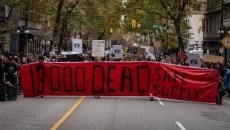Federal public servants in Ottawa who work remotely contributed 25 per cent fewer emissions than those who worked only from the office, a new report suggests as a major public sector union fights against more mandated office days.
Remote workers in Quebec contributed even fewer emissions thanks largely to greener homes heated by electric baseboards rather than natural gas, and the province's virtually all-renewable energy grid, the report said.
The report funded by the federal government is based on surveys of roughly 1,500 employees across three government offices and it looks at emissions from homes, offices, transportation and internet use.
The analysis suggests each additional weekday a hybrid employee in the National Capital Region worked remotely is associated with annual emissions reductions between about 235 and 350 kilograms of carbon emissions, roughly equivalent to burning 150 litres of gasoline.
Those savings are largely attributed to lower transportation emissions from commuting and an assumed reduction in the federal government's office space.
“The major takeaway for this is that telework is ... a more sustainable version compared to in-office work," said report co-author Farzam Sepanta. He said that's the case as long as teleworkers and hybrid workers make an "informed decision regarding their habits and behaviours."
While those reductions may be relatively small on their own, they add up when applied to thousands of federal public servants, said Sepanta, who is a PhD candidate at Carleton University. The results were specific to the federal government, but he said they also had “major takeaways for people working in the private sector."
The results track with similar studies that try to quantify the emissions of remote and hybrid work models. A study out of Cornell University and Microsoft last year estimated remote workers could have a 54 per cent smaller carbon footprint compared to on-site workers, once lifestyle choices and work arrangements were considered.
Notably, the survey of federal employees does not consider the long-term emissions implications, such as whether people may migrate from urban centres to larger suburban homes with longer commutes. The survey also draws no conclusions about how remote work could impact other facets of work, such as worker expectations, organizational culture or client satisfaction, said Sepanta.
A major public-sector union was quick to laud the results as further evidence of the benefits of remote work.
In a written statement, Public Service Alliance of Canada national president Sharon DeSousa called the study "eye-opening," and suggested the government was "squandering" a chance to build a modern workforce that "paves the way to a sustainable future."
“This eye-opening study proves what we’ve been saying all along: remote work is better work," the statement read.
Unions representing public servants promised a "summer of discontent" after the federal government announced it would mandate federal workers back to the office three days a week, up from two. The previous policy was put in place March 2023, two years after people began working remotely due to the COVID-19 pandemic.
The Treasury Board secretariat said the government funded the report as part of a broader effort to understand the emissions associated with – but not directly resulting from – its operations. The department said in a statement that the results offer helpful baseline information about emissions, as well as recommendations in several areas relating to "greening" transportation and office space.
"The Public Service’s approach to hybrid work marries the benefits of in-person collaboration, with the flexibility of remote work, while helping green government operations," read the statement.
The report's policy recommendations include downsizing physical office spaces to reduce emissions and promoting the use of flexible shared office spaces to maximize the use of buildings. It also recommends subsidies or tax incentives for employees to buy electric vehicles or take public transportation, and floats the idea of free public transit passes for employees who commit to using the system regularly.
Ottawa Mayor Mark Sutcliffe has blamed the city's transit budget shortfall on lost ridership due to the rise of remote work, saying it could take decades for the city to catch up to ridership forecasts that underpin its transit expansion.






